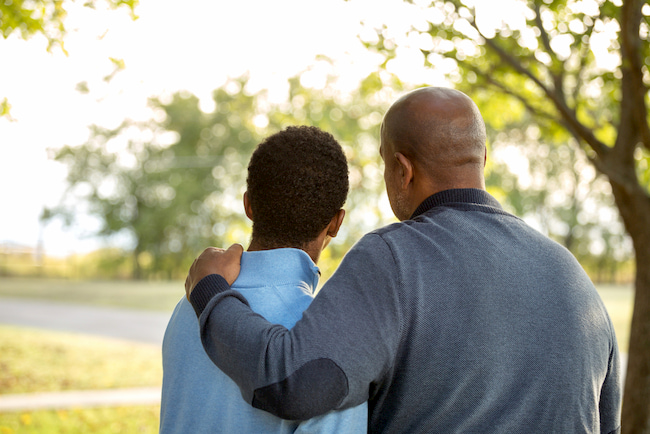When you find out that a loved one has cancer, it can be difficult to handle even as an adult. Imagine facing the situation as a child. Talking with kids about cancer requires a unique approach.
Kids are often stronger than we think. But cancer and its effects can be hard to face no matter what our age — and it often forces kids to think about illness and death in a way they wouldn’t usually.
That’s why it’s important to handle these complex conversations thoughtfully. Stephanie Alfaro, LMSW, OSW-C, an oncology social worker at Erlanger Health, offers some insight into how to approach the conversation.
Talking about cancer with young children
This point probably seems logical — what you tell your child about a loved one’s cancer diagnosis is going to vary depending on his or her age and development.
Young children, for example, need things broken down at a very basic, easily understandable level.
“What I would say to a parent explaining cancer to younger children is that we all have bad cells and good cells in our body,” Alfaro says. “Sometimes the bad cells start growing, and that is what is happening with mommy/daddy [or the person who has cancer].”
Once you’ve explained those basics, then you can delve a little further into how cancer might affect the person, in particular in ways that may be noticeable to a young child.
“You might say mommy/daddy is working with the doctors to fight the bad cells with medicine called chemotherapy,” Alfaro says. “Sometimes while we fight these cells, mommy/daddy will feel sick and may lose his or her hair, appetite or ability to be ‘normal’ mommy/daddy.”
One of the most important things you can do for kids is to reassure them that they are not to blame for the cancer.
“Say cancer sometimes just happens, and we don’t know why,” Alfaro says. “We didn’t do anything bad to get cancer in our bodies.”
Talking about cancer with older children
When children are a bit older and have more knowledge about science and life, the conversation can be more complex. Children and teens will often be more inquisitive and need more information to satisfy their questions.
“Depending on the developmental age of the child, the conversation can be a little bit more scientific,” Alfaro says. “They may know what cells are from science class, and quite possibly know that cancer is a cell that has mutated. If not, they can easily find out this information on Google.”
Because of that instant access to all sorts of information, it’s even more important to provide kids and teens with accurate, truthful details about a loved one’s cancer diagnosis and prognosis. They’ll need information from a reliable source — you and/or the medical team — to offset potentially inaccurate and even scary information they can find online.
“Sharing the real diagnosis — lung cancer, brain cancer, etc. — is important, as is allowing the child to ask questions,” Alfaro says. “Providing boundaries on where they are to look online for information or saying that if they want to research more, mom or dad must be present is important so that they don’t find false, scary or misleading information.”
And even with teens, it’s still vital to emphasize that they are not to blame for the person’s cancer diagnosis.
“The important thing to remember is that young kids and teens tend to be egocentric, and even if they say that they don’t, they may blame themselves,” Alfaro says. “Being available and reminding them often that cancer isn’t caused by bad behavior or the child causing the parent stress is very important.”
The bottom line on talking with kids about cancer
Regardless of your child’s age, there are some points that remain the same:
- Keep the conversation truthful, brief and guarantee-free. The last part is very important, since cancer is not within our control. Only guarantee or make promises about things that are certain, such as a motivation to fight the disease and a certainty that kids are not to blame for the illness.
- Tap into reputable resources. The American Cancer Society offers books and online resources specifically about telling children about cancer. Look to these and other national organizations for helpful information gleaned from the experts.
- Provide stability whenever possible. This isn’t necessarily related to the conversation about cancer itself, but it’s an important part of ensuring kids handle the news in a healthy way. This includes remaining consistent with a child’s normal schedule whenever possible, including bedtimes, school routines and sports/hobbies.
- Involve kids in an age-appropriate way. Children of all ages should be given the opportunity to be as involved as they would like to be to the level the person with cancer is comfortable with. Some children have nurturing spirits and need to be able to help in some small way.
Erlanger offers a full range of resources and services designed to help those with cancer and their loved ones. This includes nurse navigators, support groups and social workers. If you are concerned how a diagnosis may be impacting your child, talk with your pediatrician or find one here.







